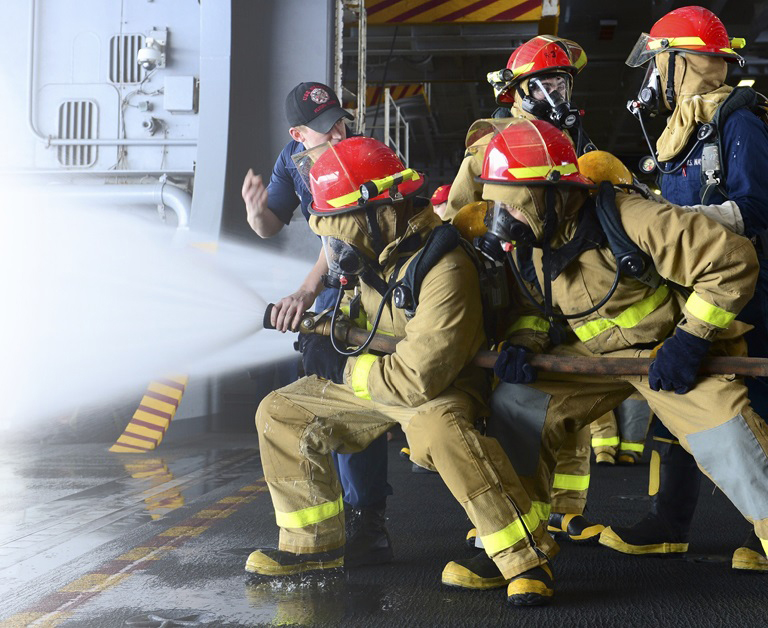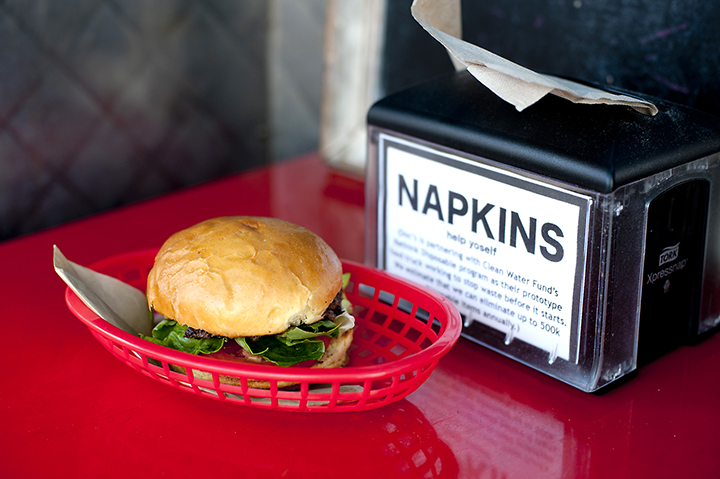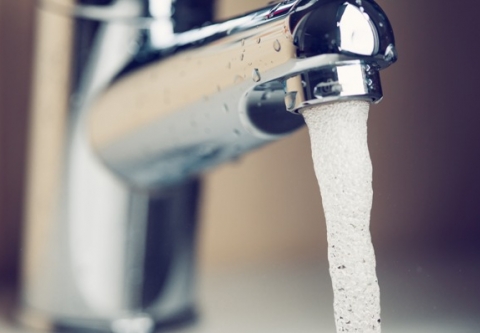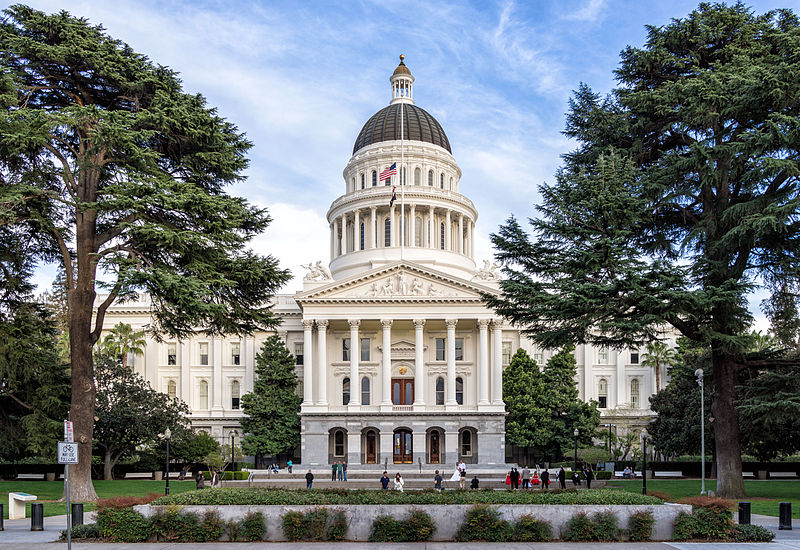In this issue
- We Can't Be Silent
- Tackling Toxic PFAS
- Protecting Communities from Oil and Gas Pollution and COVID-19
- Reusable Foodware
- Water is a Human Right
- Water Shutoffs
- Download a PDF of This Issue
We Can’t Be Silent: Black Lives Matter
We cannot ensure a safe and healthy environment for all Americans without addressing the racism that causes so much harm and inequity.
Black communities and other communities of color are often burdened with disinvestment, which leads to failing infrastructure. Polluting facilities like power plants, oil and gas operations, and incinerators are often located in or near communities of color. The people who call these communities home often don’t have access to parks, greenspace, or reliable public transportation. And they must often deal with a legacy of expulsive zoning, redlining, and bias, along with indifference from elected officials and policy makers. All of this has a devastating and generational impact on the health of the families in these communities.
This must end. We have to acknowledge and correct the historical harms that have led to clean air and clean water for some and pollution and degraded health for others. Clean Water Action is committed to combating racism and oppression in all forms, both internally and in our society. That isn’t easy. But it’s incumbent upon us to stand as a partner with those fighting for racial justice.
As part of this effort, Clean Water Action is supporting passage of ACA 5 which would put a referendum on the ballot this fall to repeal Proposition 209. Prop 209, originally passed by California voters in 1996, banned affirmative action programs in employment and education in California based on race, gender, ethnicity or national origin. On June 24, 2020, ACA 5 passed the Senate floor and will be on the ballot this November for you to vote on!
Protecting Our Health from Forever Chemicals

Should firefighters’ lives be put at greater risk because of the materials they use on the job? Should California’s water be contaminated just to maintain profits for the chemical industry? Should we continue to use chemicals that, in the midst of a pandemic, have been shown to decrease the effectiveness of vaccines?
At Clean Water Action, we don’t think so. That’s why we are fighting so hard to make sure that we stop the use of PFAS containing firefighting foam that put the health of our firefighters at serious risk and pollute our water. And with our members’ support we are winning! SB 1044, which CWA is co-sponsoring along with other environmentalists, cancer advocates, and firefighters, passed off the Senate Floor on June 26th with strong bipartisan support. Introduced by State Senator Ben Allen (Sta. Monica), SB 1044 will restrict the use of PFAS-containing firefighting foams in California. It will also require chemical companies to take responsibility for unused PFAS foams at fire stations and for informing firefighters about PFAS chemicals in their gear.
PFAS foams are used for liquid fuel fires, such as oil fires. Their effectiveness comes at a tremendous cost. Virtually all Americans have PFAS chemicals in their bodies, and studies have shown that firefighters have even greater levels. Recent monitoring has found PFAS in the water sources potentially serving as many as 19 million Californians, while fish that people and wildlife consume in San Francisco Bay have some of the highest levels in the world. Firefighting foam is a major source of all of these problems, despite the advent of new, PFAS-free foams on the market. Given the effectiveness of these new products, airports, refineries, military installations and other firefighting entities around the globe are moving away from these dangerous foams.
Thanks to Senator Allen’s leadership and strong public support, SB 1044 has the opportunity to move on the Assembly in August. We are in strong negotiations with the impacted industries, especially California’s refineries, to ensure that the switch away from PFAS foams will be done in a safe manner. But in the end, this is not only a firefighter and environmental protection measure; it is also a response to Covid 19. We must turn off the PFAS tap to ensure that vaccines and other health measures work in the months and years ahead. Restricting the use of firefighting foam is a big step in doing just that.
You can help pass SB 1044 this year and prevent more PFAS from entering our environment. Go to cleanwater.org/support-sb1044 now and let your state legislators know that we need to save our water, our firefighting heroes, and our health by turning off this source of PFAS chemicals.
COVID-19, AB 345 — and Our Health

As cases of COVID-19 have risen in California, it has becoming increasingly clear that poor air quality increases susceptibility to COIVD-19 and also makes people more vulnerable to serious illness from the virus. This is bad news for the one million Californians who live in areas with poor air quality — to say nothing of the more than five million California residents who live within a mile of oil and gas operations. Now more than ever state government must not only prevent any roll back of regulations but enact legislation that protects our families. Legislation like AB 345.
AB 345 would protect our most vulnerable from oil and gas pollution by requiring Cal GEM (Geothermal Energy Management ) Division to set a health and safety buffer zone between oil derricks and health sensitive location like schools, clinics, hospitals and homes. This would reduce the exposure to pollution of our elderly, youth, friends and family, and move us one step closer to breathing a little easier.
Furthermore it would require Cal GEM to consider a 2,500 ft. health and safety buffer zone as recommended by the California Council on Science and Technology (CCST) in a 2015 report on health and environmental impacts with oil and gas production. Contact your Senators and let them know that you support AB 345 to help protect the most vulnerable from air pollution and the worst symptoms of COVID-19.
Those who live and work in close proximity of oil and gas operations often suffer from a variety of pulmonary and cardiovascular diseases. Symptoms can include nose bleeds, headaches, dry or irritated nose, eyes, throat, and skin irritation. Long term exposure can cause heart and lung disease and combine dangerously with COVID-19.
The California Legislature should be doing everything it can to fight Covid-19 and to prioritize people over polluters. If we want to truly reduce the risk to COVID-19 to communities, we must also work to reduce the contaminants that are making us more susceptible to the virus. Please contact your Senators and let them know that you support AB 345 to help protect the most vulnerable from air pollution and the worst symptoms of COVID-19.
Protecting Kids and the Environment with Reusable Foodware

It began with a spark of interest in January 2019. Fast forward to the start of the 2019-20 school year — Palo Alto Unified School District (PAUSD) accomplished the incredible feat of phasing out seven single-use foodware items used for breakfast and lunch at 12 of their elementary schools, serving up to 3,400 students.
It wasn’t free. The purchase of reusable baskets, stainless steel sporks, durable clamshells, plus a few other infrastructure updates cost $22,831. The District hired two new part-time employees — a dishwasher and a van driver — at an annual cost of $27,000. But even with the initial investment of $49,831 to set up and maintain the new reusable food ware operation, PAUSD earned an impressive savings of $25,000 per year, after a five-month payback period.
This effort was made possible by a dedicated team of Board members, administrators, teachers, food service staff, and students. PAUSD partnered with Clean Water Fund’s ReThink Disposable team to quantify the impact of the Districts’ upstream source reduction pilot project to eliminate single-use disposables. This project took place over the 2019-2020 school year.
The pilot was a smashing success. It proves that maintaining a food system in schools that relies on daily use and disposal of foodware items is more expensive than deploying a reusable food ware operation, even when accounting for the setup and ongoing costs (e.g. reusable product ware and reusable collection stations, and additional labor and washing costs).
The savings and waste reduction is one story to tell. There’s a paramount issue at hand — the health of kids. Current research shows that the toxic additives in food packaging are wreaking havoc on human health, water resources, and the soil we use to grow our food. Many types of single-use food packaging contain a suite of additives that are known or suspected carcinogens or endocrine disruptors, such as phthalates, perchlorate, and fluorinated chemicals, meaning they can deleteriously affect the reproductive development of children. Fluorinated chemicals, also known as per-and polyfluorinated alkyl substances (“PFAS”), are synthetic chemicals commonly used in and on single-use service ware to repel water and grease. Fluorinated chemicals are called “forever chemicals” due to their persistence in the environment and in our bodies. By removing single-use food trays, plastic utensils, and disposable plastic containers from the PAUSD food system, the District reduced chronic exposure to these toxins.
This year, the Altamont Education Advisory Board awarded Clean Water Fund with a grant to replicate the PAUSD case study at Alameda County schools. The California ReThink Disposable team is thrilled to begin work on this project in July 2020.
Water is a Human Right

COVID-19 has exacerbated existing social, racial and economic disparities, placing additional strain on water infrastructure in low-income communities and water affordability for low-income residents. In California, the pandemic has left millions of without the means to pay for basic needs like safe water. Our years-long effort to improve access to safe drinking water has allowed Clean Water Action to pivot our efforts to provide relief for those struggling to access safe drinking water.
First, working with 80+ fellow community, environmental and equity organizations, Clean Water Action developed and submitted a letter to Governor Newsom urging him to place a moratorium on water shutoffs for nonpayment of bills. The governor’s April 2 executive order did just that, banning new water shut-offs and ordering reconnection for households going back to March 4.
Clean Water Action is working to gather information about the number of households unable to pay their water bill, and the impact of nonpayment on water systems, particularly small water systems serving low-income communities. Staff is working to extend shutoff protections to those who lost their water service prior to March 4. Clean Water is also supporting our allies who work directly with impacted communities who lack safe drinking water, and whose access to alternative water supplies has been limited by the crisis.
As California moves into re-opening, families and households severely impacted by the pandemic will have to grapple with large water bills on top of other deferred bills and payments. Clean Water Action, with our allies, is working to provide assistance to these households. We are advocating for payment relief of reconnection fees, late payments, other penalties and collection practices for low-income households. On a larger scale, while low-income assistance programs exist for most other utilities, California has yet to implement a statewide program for water. The creation of a low-income rate assistance program is a priority for our organization
At the federal level, Clean Water Action is working to secure funding for urgent water infrastructure and water affordability needs. A letter from dozens of California organizations to the California Congressional delegation, including Speaker Nancy Pelosi, Minority Leader Kevin McCarthy and Senators Feinstein and Harris, outlined key recommendations to be included for the next federal stimulus package.
Help continue advocating for water access and affordability by taking action! Reach out to your representatives to prioritize and support safe and affordable water for all Californians!
Do you know someone who’s had their water shut off since March 4th?
Please share this link to report water interruption of drinking water service:
For more information on COVID-19 updates from the State Water Resources Control Board visit:

